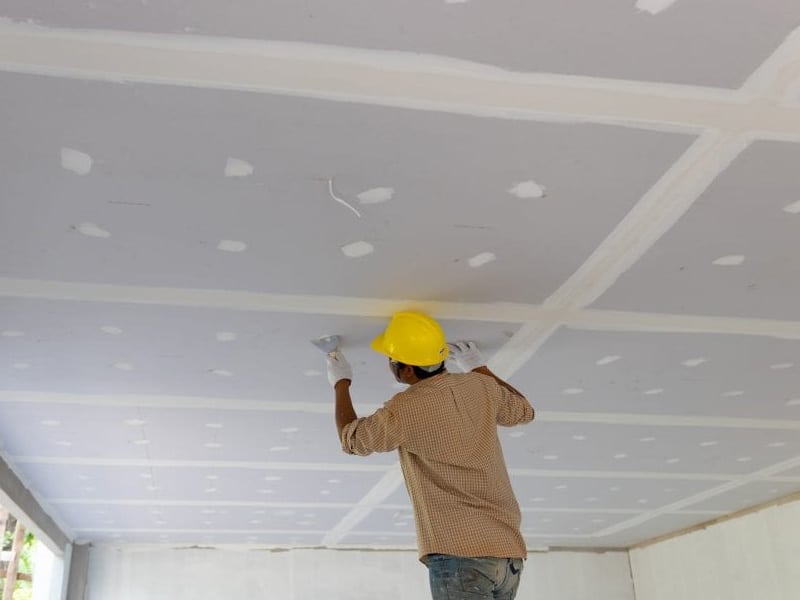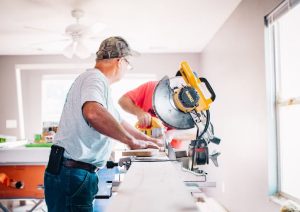Cracking noise in the ceiling at night can be heard for many different reasons. Some causes include drywall, metal paneling on your roof, or even termites consuming wood near your home.
Still, if it becomes too much, there could be unsafe conditions that need immediate attention from professionals who will fix everything before anything else happens.
You may hear creaks and strange type groans from the ceiling. You’ll likely experience them often at night but sometimes during the day if you live in an older building with wood roofs like I do!
They’re just normal sounds caused by natural expansion/contraction due to either partially or fully unsuccessfully insulating our homes’ ceilings properly (in which case there might be signs of a water leak).
Cracking noise in ceiling at night
The noises you hear are normal, but they could be caused by anything from the settling of tiles to water seepage.

The temperature changes are most likely caused by metal, glass, or wood framing moving slightly as they contract and expand to adjust their position in response.
Why do you hear strange noises in your house when there’s no one around? It turns out that what we’re experiencing today are similar effects from long ago:
our old houses were made with wood paneling on their roofs which would shrink due to yarn patterns left behind by craftspeople working centuries ago; these natural seasonal changes result.
The cracking noise you hear at night is the timber when trying to little adjust its temperature as it cools down. The low temperatures cause this contracting and thus produce various sounds, such as creaking or popping.
Different noise types
- Noise of cracking
There are many causes for the noise coming from your attic. The most common one is caused by temperature change in roof timbers, which leads to cracks and pops as they expand or contract with changes of seasons (and compared against each other).
- Creaking
The noise from your ceiling is most likely a result of either heat or cold-related cracks. This, as with many other types of noises found in buildings (like creaks), can be attributed to the structure and how it reacts when faced with different conditions.
- Taping
The tapping sound you hear when the air conditioning turns on and off is caused by metal ventilation gaps in your house’s roof.
The HVAC system takes warm exhaust gas from inside, then sends it through these vents where cool fresh outside heads towards them as needed!
- Rodents noise
If you hear strange noises coming from your roof, it could mean that wildlife like mice or rats are living there. You might find signs of their habitation in droppings, and other refuse on top-of walls near ceilings where they nest during warmer months when comfort ranges improve ventilation rates.

Ceiling cavities provide an ideal environment for these creatures to thrive because air flows easily through them without being sealed off too tightly by boundaries between different levels within buildings–perfect conditions if one seeks increased airflow with little interference.
Basic causes of cracking noise in ceiling at night
- Expansion due to the thermal effect
Matter changes shape and volume when temperature varies. In simple words, the warmth of an object rises, and its molecular moves slower but stays put, giving it more mass than if they were running around freely without any restrictions from gravity or pressure; this causes a gradual expansion that can be heard during colder seasons where materials contract due to decreasing pressures inside houses.
The matter is constantly changing in response to temperature changes. As the weather got colder, materials contracted and produced cracking noises because their molecules move faster when cold than warmth permits them to – this causes an expansion of size!
- Damage caused by water
If you leak the roof, this directly leads to water-damaged ceilings that can be costly and hazardous for both homeowners’ health, depending on where they are located in their homes.
Water damage can cause various issues, including the cracking noise you may hear. If your house experiences leaky roofs or attics that contain standing water for an extended period, then this could lead to ceiling collapse due to progressive deterioration from moisture in wood structures over time caused by expansion and contraction with changes in seasons; not only does it result into expensive repairs but also poses health hazards because certain bugs thrive around wet conditions like termites.
- Poor fastening of roof
A thumping bass can be heard throughout your house, The cause may not always seem like it’s coming from one place, but it sounds like it’s everywhere at once! It could result from loose carpets or flooring that has been improperly fastened down with brackets.
The main cause of this kind of noise is not properly fastened flooring. If it’s not tightly stuck to the points, you may experience creaking and vibrating, creating quite an annoying sound when someone walks around or drives over their floor! Make sure that any screws are tight enough by checking them with your fingers before going back down again- there shouldn’t be much else needed from here on out.
Ways to stop cracking noise in ceiling at night
This is a great way to reduce noise coming directly from the ceiling. Spray polyurethane cells will expand and cover the ceiling or spaces before stiffening, stopping bad sound waves in their tracks and sealing up any remaining space where you can bang your head without bothering someone else!
Spray-on soundproofing would not be as effective at blocking louder noises because it doesn’t have the volume to reabsorb noise.
- Fastening roof
Installing roof fasteners is one of the most effective ways to stop noises from your ceilings. Roofing materials such as metal nail strips or staples can develop thermal barriers within their system, improving insulation effectiveness by forming an obstacle for heat transfer through these channels called “thermal avenues.”

Metal nails have been shown in studies conducted at Stanford University Medical Center & Oregon State University, among other places around America.
The soundness of your roof is integral to its longevity. Shelters are usually designed for short-term use, but if they’re not fastened properly, or the nails aren’t long enough, you could be subjecting yourself.
- Add bracing
Adding bracing to the building’s trusses or roof rafters will reduce the popping noise coming from your home. The size for these braces is two by six material with longer timber screws but would not be like nails, so they don’t damage the structural stability of other parts that need repair during the installation process!
The last thing you can do to fix your noisy roof is added diagonal braces. They are made of two-by-six material with large timber screws but not nails, so they won’t damage anything important outside, like walls or windows nearby.
The best time for this type of wood strengthening measure would be during periods without heavy snowfall because it will allow water that might accumulate inside over the winter months to run off more easily when temperatures rise again!
Conclusion
Though the cause of the cracking noise in ceiling at night is still unknown, it’s probably best to know the caution and have a professional take a look. If you need repair work, shop for a good estimate; get at least three quotes before deciding on a contractor. So please don’t feel too bad; we all have those days where everything seems like it’s falling apart around us.



